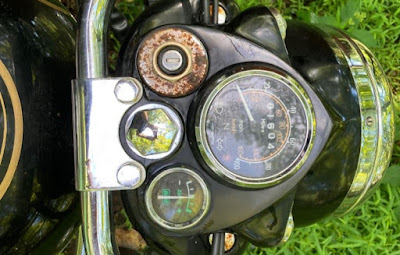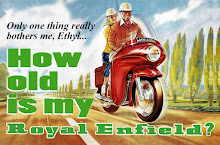 |
| A sad old Royal Enfield. Low miles. But why doesn't it run? |
I recently corresponded with a gentleman who ended up buying a 2003 Royal Enfield Bullet that didn't run. As we discussed it, the question of how much to offer kept coming up.
I'm not a mechanic, so my reaction was that no price could be too low as long as the seller wasn't willing to even try to get it going. Maybe some fresh gas and jumper cables would have produced at least a couple of hopeful hiccups.
But the buyer was confident of his mechanical abilities and was looking for a project anyway. So he made the leap. I hope it works out.
If the thing indeed just needs gas and a battery, he got a nice bargain.
More money (and thus more risk) was involved in another email conversation, this one with a man eyeing a 1968 Royal Enfield Interceptor. Fixing a common 15-year-old Bullet, with parts galore available from India, is one thing. Fixing a rare 50-year-old British motorcycle is another.
Despite its age and rough condition, the would-be-buyer thought it would still be a "worthwhile investment."
I know little about classic Interceptors, except that they are impressive in every category, including power, performance, style, beauty and asking price. So I kicked the question to Chris Overton, a Royal Enfield enthusiast who knows them well.
His reply:
"The word 'investment' in his letter may just be an unfortunate word choice. The economics of fixing up bikes is well known, and the book-keepers equation does not balance without a substantial measure of emotion or neurosis as a sort of thumb on the scales."
That sums it up pretty well, I think.
Even a non-mechanic like me has had the experience of encountering a needy old vehicle with some admirable traits and thinking "I could fix that. I could save it. I can imagine how wonderful it could be again."
In my hands, too many times that story has ended with the object of my enthusiasm going to the junk yard. None of those vehicles ever cast a sad eye after me as I walked away.
We love things. Things don't love us back. But we love to forget that.
























I could write an entire article on this.
ReplyDeleteI bought my Bullet in pieces needing major engine work. I could have bought one running for not a lot of money but the resurrection was as much a part of the 'hobby' as being able to ride it. Thus my book "Dodging Bullets" which you reviewed some time ago. If the journey is not the point of such a project, only the final result, it shouldn't be undertaken.
I recently bought a 1964 Interceptor, also not running. Working on the Bullet developed a real appreciation in the engineering and history of RE. Though the 750 twin will be more difficult and more expensive to get going it is another journey I look forward to taking. It is unlikely one will profit at all from such a project. At best we may 'break even'. But the cost paid for parts and in time should be considered the price of an advanced education in these things.
"Dodging Bullets" is just the book for anyone considering buying a fixer-upper to read. My review of it is here.
DeleteLook up Angus D. Campbell on YouTube. This man lovingly restores BSA and Triumph motorcycles, many found in the most abysmal condition. He does it because he is an enthusiast with solid mechanical credentials, not because he figures he has some private largesse that will reap financial rewards. This is why people really do stuff like this. If that is you, then go for it. Otherwise, go to the dealer and buy new.
ReplyDeleteWell spoke. Bullets demand either mechanical willingness on the part of the owner or "Leno" like money and paid staff. Not a machine for the dilettante crowd, but that is part of their appeal to me. In 1940 when they were designed, some mechanical aptitude was expected on the part of the buyer. Lubricants & fuels are not what we have today. A "top end" every 6,000 - 12,000 miles was expected. Keeping the shifter & clutch bits fettled was just assumed, as was staying on top of valve & chain adjustments. A maintained Bullet is "reliable" in the sense that it'll start & run & take you where you need to go at a reasonable pace, everytime, IF you do your part. A "Mechanically Empathetic" Bullet owner should have fewer "Mystery" problems than the owner of a modern machine when it fails to run - points, carb & pushrods see to that. - CW -
ReplyDelete